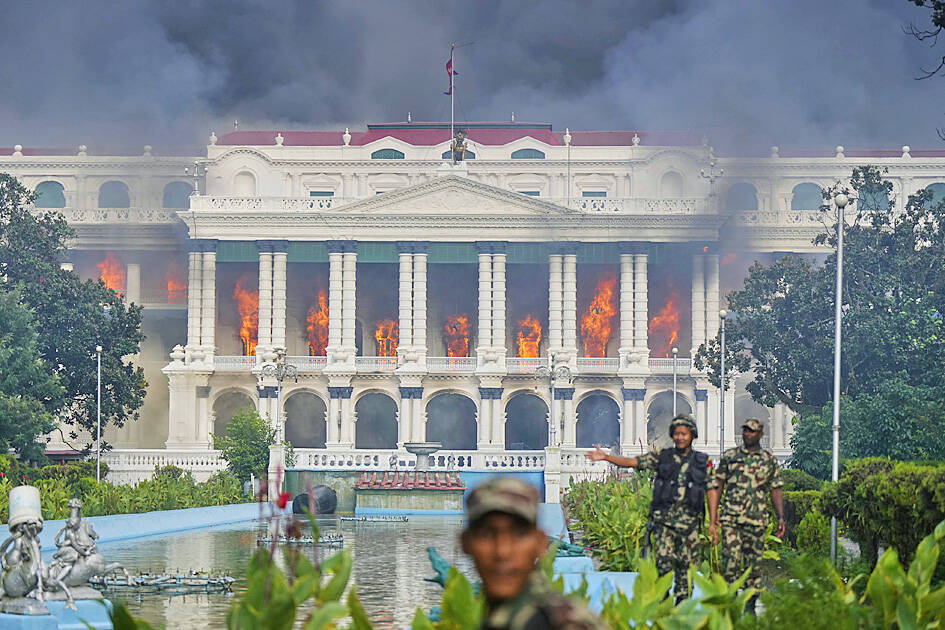Nepalese Prime Minister Khadga Prasad Oli resigned yesterday as protests against a short-lived ban on social media grew increasingly violent and expanded into broader criticism of his government and accusations of corruption among the country’s political elite.
The resignation had little effect on the demonstrations. Tens of thousands of protesters remained on the streets late in the day, blocking roads, storming government buildings and setting them on fire, and, in some cases, attacking political leaders. Army helicopters ferried some ministers to safe places.
A day earlier, demonstrations led by young people angry about the blocking of several social media sites gripped the country’s capital, and police opened fired on the crowds, killing 19 people.

Photo: AP
The ban was lifted yesterday, but the protests continued, fueled by anger over the deaths and growing frustration with the political elite in the nation wedged between China and India.
As the protests intensified, Oli announced he was stepping down. Nepalese President Ram Chandra Poudel accepted the resignation and appointed Oli to lead a caretaker government until a new one is in place — but it was unclear what power he would wield or even where he was.
Poudel, the ceremonial head of state, made a public appeal to the protesters to come forward for dialogue to find a peaceful resolution and stop further escalation of the situation.
The army issued a statement calling for calm and urging political dialogue, but did not give any other details.
The demonstrations — called the protest of Gen Z — began after the government blocked platforms, including Facebook, X and YouTube, saying the companies had failed to register and submit to government oversight.
However, they spiraled to reflect broader discontent. In particular, many young people are angry that the children of political leaders — so-called “nepo kids” — seem to enjoy luxury lifestyles and numerous advantages while most young people struggle to find work. With youth unemployment running at about 20 percent last year, according to the World Bank, the government estimates that more than 2,000 young people leave the country every day to seek work in the Middle East or southeast Asia.
“I am here to protest about the massive corruption in our country,” said Bishnu Thapa Chetri, a student. “The country has gotten so bad that for us youths there is no grounds for us to stay.”
Videos shared on social media showed protesters beating up Nepali Congress party leader Sher Bahadur Deuba and his wife, Arzu Rana Deuba, the current foreign minister. Both appeared to be bleeding, while one video showed the party leader being helped to safety. The party is the country’s largest and is part of the governing coalition.

Right-wing political scientist Laura Fernandez on Sunday won Costa Rica’s presidential election by a landslide, after promising to crack down on rising violence linked to the cocaine trade. Fernandez’s nearest rival, economist Alvaro Ramos, conceded defeat as results showed the ruling party far exceeding the threshold of 40 percent needed to avoid a runoff. With 94 percent of polling stations counted, the political heir of outgoing Costa Rican President Rodrigo Chaves had captured 48.3 percent of the vote compared with Ramos’ 33.4 percent, the Supreme Electoral Tribunal said. As soon as the first results were announced, members of Fernandez’s Sovereign People’s Party

MORE RESPONSIBILITY: Draftees would be expected to fight alongside professional soldiers, likely requiring the transformation of some training brigades into combat units The armed forces are to start incorporating new conscripts into combined arms brigades this year to enhance combat readiness, the Executive Yuan’s latest policy report said. The new policy would affect Taiwanese men entering the military for their compulsory service, which was extended to one year under reforms by then-president Tsai Ing-wen (蔡英文) in 2022. The conscripts would be trained to operate machine guns, uncrewed aerial vehicles, anti-tank guided missile launchers and Stinger air defense systems, the report said, adding that the basic training would be lengthened to eight weeks. After basic training, conscripts would be sorted into infantry battalions that would take

GROWING AMBITIONS: The scale and tempo of the operations show that the Strait has become the core theater for China to expand its security interests, the report said Chinese military aircraft incursions around Taiwan have surged nearly 15-fold over the past five years, according to a report released yesterday by the Democratic Progressive Party’s (DPP) Department of China Affairs. Sorties in the Taiwan Strait were previously irregular, totaling 380 in 2020, but have since evolved into routine operations, the report showed. “This demonstrates that the Taiwan Strait has become both the starting point and testing ground for Beijing’s expansionist ambitions,” it said. Driven by military expansionism, China is systematically pursuing actions aimed at altering the regional “status quo,” the department said, adding that Taiwan represents the most critical link in China’s

EMERGING FIELDS: The Chinese president said that the two countries would explore cooperation in green technology, the digital economy and artificial intelligence Chinese President Xi Jinping (習近平) yesterday called for an “equal and orderly multipolar world” in the face of “unilateral bullying,” in an apparent jab at the US. Xi was speaking during talks in Beijing with Uruguayan President Yamandu Orsi, the first South American leader to visit China since US special forces captured then-Venezuelan president Nicolas Maduro last month — an operation that Beijing condemned as a violation of sovereignty. Orsi follows a slew of leaders to have visited China seeking to boost ties with the world’s second-largest economy to hedge against US President Donald Trump’s increasingly unpredictable administration. “The international situation is fraught